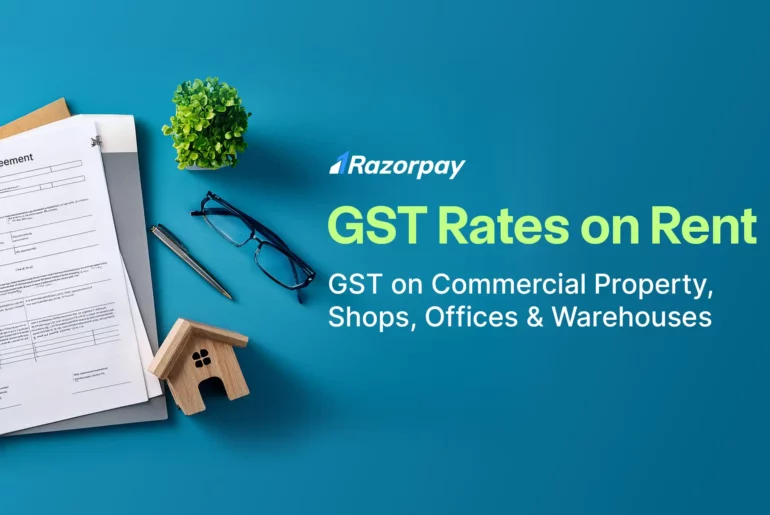Rent for commercial properties is subject to an 18% GST, which landlords must collect from tenants and remit to the government. However, residential property rent including horse rent is generally exempt from GST, as clarified by the 48th GST Council. If a property is rented solely for residential purposes, no GST is applicable, even if the tenant is a business owner. The exception applies only if the property is used in part or full for commercial purposes.
Related Read: A Guide to GST on Flat Purchases
GST on Renting Commercial property
Renting out commercial properties is treated as a supply of services under GST law and is subject to an 18% GST. Landlords are required to collect this tax from tenants and remit it to the government. This applies to all types of commercial properties, including office spaces, shops, warehouses, and industrial buildings.
Exemptions on GST for Renting Commercial Property
There are certain exemptions for properties managed by registered charitable or religious trusts. To qualify for GST exemption, the rental charges must meet the following conditions:
- Room rent must not exceed ₹1,000 per day.
- Rent for community halls or open areas should be below ₹10,000 per day.
- Shops or commercial space rents must be below ₹10,000 per month.
Additionally, if your total income from all business activities, including rent from commercial properties, exceeds ₹20 lakh per annum, you must register under GST. This includes the obligation to collect and deposit GST on the rent.
The reverse charge mechanism (RCM) applies if the tenant is a registered business under GST and the landlord is not registered. In such cases, the tenant is responsible for paying the GST directly to the government under RCM provisions, which can increase the overall cost of renting commercial properties, especially for businesses dealing with unregistered landlords.
Related Read: GST Exemption: List of Goods and Services Exempt Under GST
GST on Renting of Residential Property
Renting residential property including house rent is generally exempt from GST, as clarified by the 48th GST Council. If a property is rented solely for residential purposes, tenants do not have to pay GST, even if they are business owners. This exemption ensures that individuals living in rented homes can do so without the added burden of tax.
Exemptions on GST for Renting Residential Property
There are exceptions to this exemption. If the residential property is furnished or used partially for commercial purposes, GST may apply. Additionally, landlords with a total annual income exceeding ₹20 lakh from all business activities, including residential rent, must register under GST and comply with relevant regulations. Understanding these guidelines is essential for both landlords and tenants to ensure compliance with GST laws.
Tax on Income from Rent: Pre-GST Era
Before the implementation of GST, landlords had to register for service tax if their total taxable services, including rental income, exceeded ₹10 lakh per annum. Service tax applied only to commercial properties or residential properties used for commercial purposes, at a rate of 15%.
Rental income from residential properties let out solely for residential use was exempt from service tax. Therefore, landlords with rental income from residential properties under ₹10 lakh did not need service tax registration. However, if a residential property was used for commercial activities, it attracted service tax.
The pre-GST framework created a threshold that limited service tax liabilities, allowing many landlords with lower rental incomes to remain outside the tax net. With the introduction of GST, the threshold for tax applicability was raised to ₹20 lakh, simplifying the tax structure and reducing the burden on landlords previously subject to service tax.
How to Calculate GST on Rented Properties?
Calculating GST on rented properties is straightforward and is based solely on the rent received by the landlord, not including any additional fees such as maintenance costs. For commercial properties, the GST rate is set at 18%. The formula for calculating GST is:
GST = (Rent x 18%) / 100
Examples:
Commercial Property with Standard Rent:
If you rent out an office space for ₹50,000 per month, the GST calculation would be:
GST = (₹50,000 x 18%) / 100 = ₹9,000
In this case, the landlord needs to remit ₹9,000 as GST on the ₹50,000 monthly rent.
Residential Property Rented for Commercial Use:
If a residential property is rented out for commercial purposes, such as a warehouse, and the monthly rent is ₹25,000, the GST calculation would be:
GST = (₹25,000 x 18%) / 100 = ₹4,500
Here, the landlord would need to pay ₹4,500 as GST on the ₹25,000 monthly rent.
By applying this formula, landlords can easily determine their GST obligations on rental income.
Related Read: GST on Maintenance Charges
ITC Provisions for GST Charged on Rent
Under GST regulations, landlords paying GST on rent can typically claim Input Tax Credit (ITC) for the tax paid, provided they meet all necessary conditions for claiming it. This means that if you are paying GST on rent, you can offset this amount against your other tax liabilities.
ITC on Repairs and Renovations
The GST paid on repairs, maintenance, and brokerage associated with properties rented out is generally eligible for ITC. However, this is only applicable if the expenses are not capitalized in the landlord’s books. According to Section 17(5) of the CGST Act, ITC is disallowed on certain expenditures, including costs related to constructing immovable property for personal use or for furthering one’s business.
In summary, while GST on repairs and brokerage for rented properties can be claimed as ITC, it is crucial to ensure that these costs are not capitalized, as capitalized expenses are not eligible for credit.
How to Check Place of Supply for Charging CGST, SGST, or IGST
Determining the place of supply is crucial for landlords to understand whether to charge CGST and SGST or IGST when renting out property. The place of supply depends on the locations of both the landlord and the tenant, as well as where the property is situated. Here are some key scenarios:
Scenario 1: Landlord Registered in a Different State
If the landlord is registered in a state different from where the rented property is located, the place of supply will be the location of the property. This is considered an interstate supply, and IGST will be charged.
Example: If Mr. Sharma, registered in Delhi, rents out a commercial property in Punjab, he will charge IGST at 18%. Mr. Sharma does not need to register for GST in Punjab.
Scenario 2: Both Landlord and Tenant Registered in the Same State
When both the landlord and tenant are registered in the same state as the property, they will charge both CGST and SGST, each at 9%.
Example: If Ms. Patel, registered in Gujarat, rents her commercial property in Ahmedabad, she will charge CGST and SGST of 9% each.
Scenario 3: Landlord Registered in the Same State, Tenant in Another State
In this scenario, if the landlord is registered in the same state as the property but the tenant is registered in a different state, CGST and SGST will still be charged. However, the tenant cannot claim ITC on these taxes if they are not registered in the state where the property is located.
Example: If Mr. Rao from Maharashtra stays at a hotel in Rajasthan, where the hotel is registered, both CGST and SGST will be applied to the rent. Since Mr. Rao is registered in a different state, he cannot claim ITC for the GST paid.
Impact of GST Rate Changes on Rental Market
GST rate changes significantly affect India’s rental market:
- Commercial Properties: An 18% GST rate can increase tenant costs, potentially making these properties less attractive. This may lead to rent negotiations or reconsideration of investments, impacting supply and demand.
- Residential Properties for Commercial Use: GST applies to residential properties used for commercial purposes, such as co-living spaces. This added tax can reduce profit margins and make such ventures less feasible. However, purely residential rentals remain GST-exempt, which is beneficial for the residential rental market.
- Historical Impact: Changes in GST rates have historically influenced rental prices and market behavior, shaping investment decisions and compliance requirements. Higher taxes may deter investment in commercial and high-end residential rental markets.
GST Compliance and Documentation for Landlords
Landlords renting out commercial properties must adhere to specific GST compliance requirements:
- GST Registration: If the annual rental income exceeds Rs. 20 lakh (or Rs. 10 lakh for special category states), landlords are required to obtain a GST registration number.
- Invoicing: Landlords must issue GST-compliant invoices to tenants, detailing the rental amount, GST rate, and other relevant information.
- Input Tax Credit (ITC): Landlords can claim ITC on eligible expenses related to the property, such as property tax, maintenance, and repairs.
- GST Returns: Regular filing of GST returns (GSTR-1, GSTR-3B, and GSTR-9) is mandatory to report rental income and ITC claims.
- Record Keeping: Maintain detailed records of rental income, expenses, and GST payments for audit purposes.
Also Read:
Frequently Asked Questions
1. What is GST on rent under Reverse Charge Mechanism (RCM) and when does it apply?
GST on rent under the Reverse Charge Mechanism (RCM) means that if the landlord is not registered under GST, the tenant, who is registered, must pay the GST directly to the government. The applicable rate is 18% for commercial properties.
2. Does Renting Out a Property Attract GST?
Yes, renting out a property can attract GST under certain conditions. According to the GST Act, leasing an industrial, commercial, or residential property to a corporate entity, or providing a license to occupy, is considered a supply of services and is subject to an 18% GST. However, if the residential property is rented solely for residential purposes, GST does not apply.
3. Who has to register when the property is rented out to businesses?
If your total annual business income, which includes rental earnings and any other exempted income, exceeds Rs. 20 lakh, you are required to register under GST.
For example, if Mrs. Riya earns an annual rental income of Rs. 30 lakh from multiple properties she owns and manages, her total business income surpasses the Rs. 20 lakh threshold. Therefore, she must register herself under GST to comply with the tax regulations.
4. What is the GST threshold limit for rent?
If the total annual business income, including rental earnings, exceeds Rs. 20 lakh, GST registration is mandatory.
5. Is there no GST paid on residential property?
GST is not applicable on rental income from residential properties if they are rented out for personal use as residences. However, it is applicable if the same property is rented out for commercial purposes or to a business entity.
6. Is GST applicable on rent received from a commercial property?
Yes, GST is applicable on rent received from commercial properties at a rate of 18%.
7. Are there any exemptions on GST for renting properties?
Yes, GST is exempt on rental income from residential properties rented for personal use and properties managed by religious or charitable trusts under specific conditions (For example, room rentals under Rs. 1,000 per day).
8. Who is responsible for paying GST on rent?
The landlord is responsible for paying GST on rental income when the property is rented out for commercial purposes or when a residential property is rented out to a business.
9. Does a tenant need to pay GST if the landlord is not registered under GST?
No, if the landlord is not registered under GST, the tenant does not need to pay GST on the rent.
10. Does GST apply to maintenance charges paid along with rent?
Yes, GST applies to maintenance charges paid along with rent for commercial properties or residential properties used for commercial purposes.
11. Is TDS on rent affected by GST?
TDS on rent is a separate tax liability from GST and is not affected by the applicability of GST.



